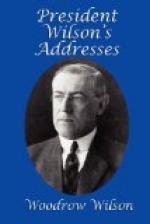Some of the addresses are state papers, read to Congress, and were carefully composed. Others, delivered in various places, appear to have been more or less extemporaneous. All are full of their author’s political philosophy, and many of them contain expressions of his opinions on general subjects, such as personal character and conduct.
In order more fully to appreciate the weight of experience and the maturity of reflection which give value to his words, it will be worth while to consider Mr. Wilson’s entire career as a scholar and man of letters, paying particular attention to the growth of his political ideals and to the qualities of his style.
To be a literary artist, a writer must possess a constructive imagination. He must be a man of feeling and have the gift of imparting to others some share of his own emotions. On almost every page of President Wilson’s writings, as in almost all his policies, whether educational or political, is stamped the evidence of shaping, visionary power. Those of us who have known him many years remember well that in his daily thought and speech he habitually proceeded by this same poetic method, first growing warm with an idea and then by analogy and figure kindling a sympathetic heat in his hearers.
The subjects that may excite an artist’s imagination are infinitely numerous and belong to every variety of conceivable life. A Coleridge or a Renan will make literature out of polemical theology; a Huxley will write on the physical basis of life with emotion and in such a way as to infect others with his own feelings; a Macaulay or a Froude will give what color he please to the story of a nation and compel all but the most wary readers to see as through his eyes. We are too much accustomed to reserve the title of literary artist for the creator of fiction, whether in prose or in verse. Mr. Wilson is no less truly an artist because the vision that fires his imagination, the vision he has spent his life in making clear to himself and others and is now striving to realize in action, is a political conception. He has seen it in terms of life, as a thing that grows, that speaks, that has faced dangers, that is full of promise, that has charm, that is fit to stir a man’s blood and demand a world’s devotion; no wonder he has warmed to it, no wonder he has clothed it in the richest garments of diction and rhythm and figure.




